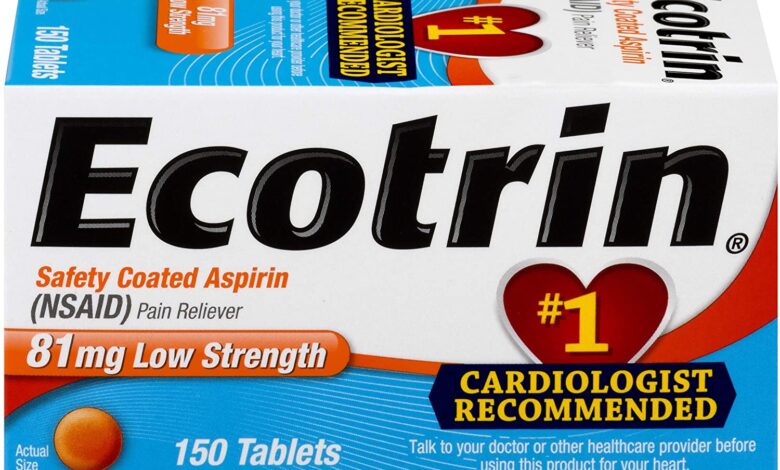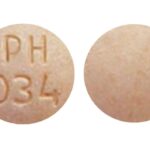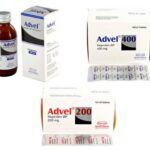Ecotrin Pills: Uses, Dosage, Side Effects, Warning

Ecotrin pill is a brand of aspirin, a nonsteroidal anti-inflammatory drug (NSAID) used to relieve mild to moderate aches and pains, swelling, and fever.
Ecotrin pill is also used to prevent heart attacks in people who have had a heart attack in the past or who have angina (chest pain that occurs when the heart does not get enough oxygen). Ecotrin pill is also used to reduce the risk of death in people who are experiencing or who have recently experienced a heart attack. Ecotrin pill is also used to prevent ischemic strokes (strokes that occur when a blood clot blocks the flow of blood to the brain) or mini-strokes (strokes that occur when the flow of blood to the brain is blocked for a short time) in people who have had this type of stroke or mini-stroke in the past.
Ecotrin pills will not prevent hemorrhagic strokes (strokes caused by bleeding in the brain). Aspirin is in a group of medications called salicylates. It works by stopping the production of certain natural substances that cause fever, pain, swelling, and blood clots.
How should I take Ecotrin?
Use exactly as directed on the label, or as prescribed by your doctor. Always follow directions on the medicine label about giving Ecotrin to a child.
- Take with food if Ecotrin upsets your stomach.
- You must chew the chewable tablet before you swallow it.
- Do not crush, chew, break, or open an enteric-coated or delayed/extended-release pill. Swallow it whole.
Tell your doctor if you have a planned surgery. Do not use Ecotrin if you smell a strong vinegar odor in the medicine bottle. The medicine may no longer be effective.
What special precautions should I follow?
Before taking Ecotrin,
• tell your doctor and pharmacist if you are allergic to Aspirin, other medications for pain or fever, tartrazine dye, or any other medications.
• tell your doctor and pharmacist what prescription and nonprescription medications, vitamins, nutritional supplements, and herbal products you are taking or plan to take. Be sure to mention any of the following: acetazolamide (Diamox); angiotensin-converting enzyme (ACE) inhibitors such as benazepril (Lotensin), captopril (Capoten), enalapril (Vasotec), fosinopril (Monopril), lisinopril (Prinivil, Zestril), moexipril (Univasc), perindopril, (Aceon), quinapril (Accupril), ramipril (Altace), and trandolapril (Mavik); anticoagulants (‘blood thinners’) such as warfarin (Coumadin) and heparin; beta blockers such as atenolol (Tenormin), labetalol (Normodyne), metoprolol (Lopressor, Toprol XL), nadolol (Corgard), and propranolol (Inderal); diuretics (‘water pills’); medications for diabetes or arthritis; medications for gout such as probenecid and sulfinpyrazone (Anturane); methotrexate (Trexall); other nonsteroidal anti-inflammatory drugs (NSAIDs) such as naproxen (Aleve, Naprosyn); phenytoin (Dilantin); and valproic acid (Depakene, Depakote). Your doctor may need to change the doses of your medications or monitor you more carefully for side effects.
• if you are taking Ecotrin on a regular basis to prevent heart attack or stroke, do not take ibuprofen (Advil, Motrin) to treat pain or fever without talking to your doctor. Your doctor will probably tell you to allow some time to pass between taking your daily dose of Ecotrin and taking a dose of ibuprofen.
• tell your doctor if you have or have ever had asthma, frequent stuffed or runny nose, or nasal polyps (growths on the linings of the nose). If you have these conditions, there is a risk that you will have an allergic reaction to Ecotrin. Your doctor may tell you that you should not take Ecotrin.
• tell your doctor if you often have heartburn, upset stomach, or stomach pain and if you have or have ever had ulcers, anemia, bleeding problems such as hemophilia, or kidney or liver disease.
• tell your doctor if you are pregnant, you plan to become pregnant, or if you are breast-feeding. Low dose aspirin 81-mg may be taken during pregnancy, but aspirin doses greater that 81 mg may harm the fetus and cause problems with delivery if it is taken around 20 weeks or later during pregnancy. Do not take aspirin doses greater that 81 mg (e.g., 325 mg) around or after 20 weeks of pregnancy, unless told to do so by your doctor. If you become pregnant while taking aspirin or aspirin containing medications, call your doctor.
• if you are having surgery, including dental surgery, tell the doctor or dentist that you are taking Ecotrin.
• if you drink three or more alcoholic drinks every day, ask your doctor if you should take Ecotrin or other medications for pain and fever.
What special dietary instructions should I follow?
Unless your doctor tells you otherwise, continue your normal diet.
What side effects can Ecotrin cause?
Ecotrin may cause side effects. Tell your doctor if any of these symptoms are severe or do not go away:
• nausea
• vomiting
• stomach pain
• heartburn
Some side effects can be serious. If you experience any of the following symptoms, call your doctor immediately:
• hives
• rash
• swelling of the eyes, face, lips, tongue, or throat
• wheezing or difficulty breathing
• hoarseness
• fast heartbeat
• fast breathing
• cold, clammy skin
• ringing in the ears
• loss of hearing
• bloody vomit
• vomit that looks like coffee grounds
• bright red blood in stools
• black or tarry stools
Ecotrin may cause other side effects. Call your doctor if you experience any unusual problems while you are taking this medication.
If you experience a serious side effect, you or your doctor may send a report to the Food and Drug Administration’s (FDA) MedWatch Adverse Event Reporting program online (http://www.fda.gov/Safety/MedWatch) or by phone (1-800-332-1088).





